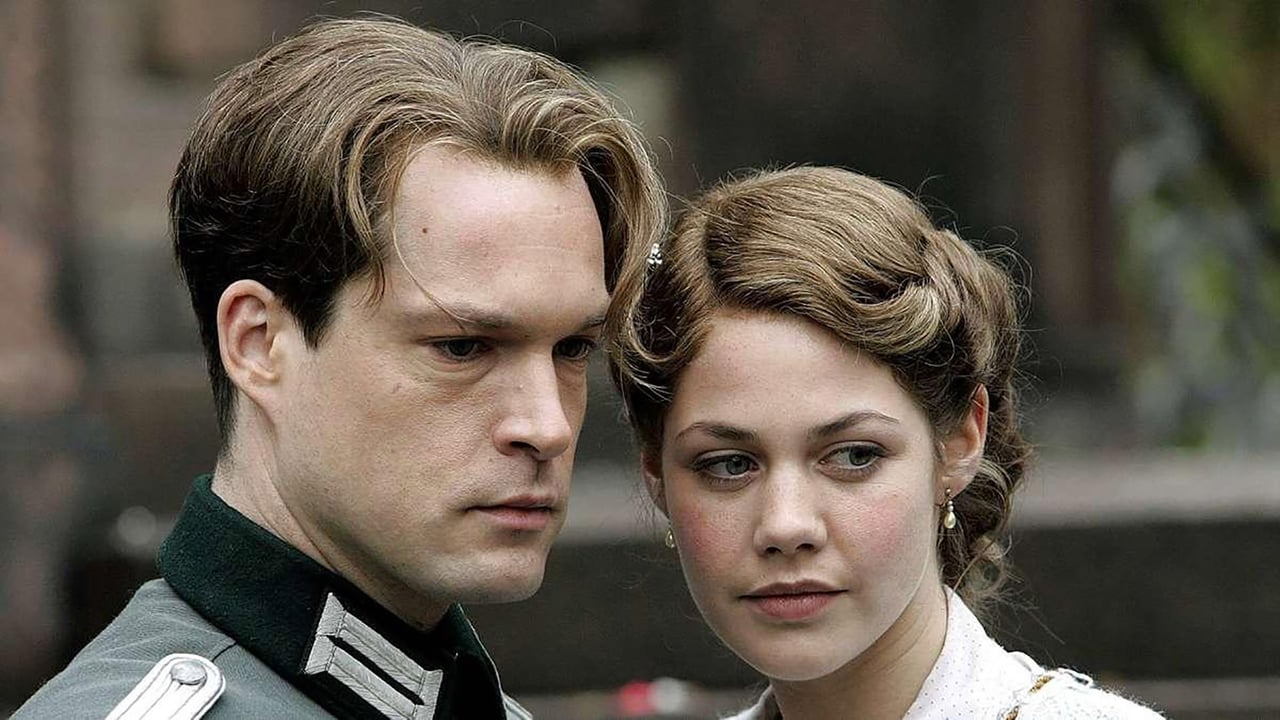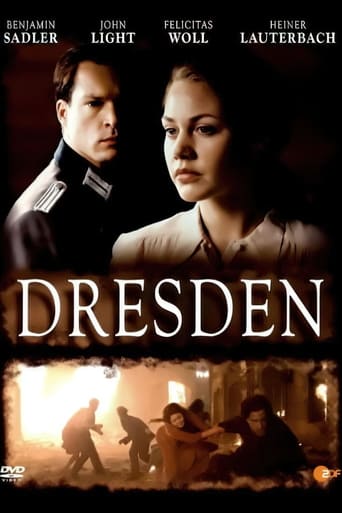Taraparain
Tells a fascinating and unsettling true story, and does so well, without pretending to have all the answers.
Helllins
It is both painfully honest and laugh-out-loud funny at the same time.
Kirandeep Yoder
The joyful confection is coated in a sparkly gloss, bright enough to gleam from the darkest, most cynical corners.
Janis
One of the most extraordinary films you will see this year. Take that as you want.
Robert J. Maxwell
The central figure in this series is Felicitas Woll, a young nurse in a Dresden hospital who secretly helps a wounded British pilot, John Light, out of simple decency and then falls in love with him, despite her imminent marriage to a rather stiff doctor. It's all about her. And she carries it off nicely, cheerfully for the most part. If at first she looks a little chubby, after a few minutes of exposure she comes to resemble Meg Ryan with her gay smile. She has the most engaging nose too. Unremarkable except at its tip where its ordinary slope forms an impudent lump.It's a lengthy miniseries mostly in German with English subtitles. I wish more Americans were able to see this because it's intelligent, and many American's don't seem to get out much, and the younger among us don't hear much about Dresden. They're lucky if they know who fought who in World War II. Really. Forty percent of high school seniors think the US fought with the Nazis against the Russians in WW2. That's high school seniors, mind you. Back to the film. Like many mini-series it has multiple sub plots and an abundance of improbabilities. There's a nice couple, the Goldbergs, still surviving in Dresden because the wife is not a Jew. Yes, there were still Jews at large in Germany. One of the survivors of Dresden was the diarist Victor Klemperer, cousin to Otto, the conductor, and Werner Klemperer, or Colonel Klink as he's better known.There is Felicitas Woll's family -- an upright doctor/father who is trying desperately to bribe the way for his wife and daughters to Basel. (Kids, Basel is in Switzerland. Switzerland was neutral in World War II. It's usually neutral in war time because nobody wants a bunch of mountains, cows and cuckoo clocks.) They don't make it. Felicitas' love affair with the British pilot doesn't survive the immediate post-war period.I can't describe all of the details of all of the sub plots. The acting is unimpeachable and the photography and CGIs are outstanding for a TV production. When Dresden has been turned into an inferno, we don't simply see buildings on fire. We see wind machine whipping burning pieces of debris and sometimes people through the air with hurricane force winds. And there are some unusual touches. When bombs leave the Lancasters, they cause the release mechanisms to rattle. It's a small thing but no one has bothered with it before. And when there is the flash of a distant explosion, it takes a second or two for the WHOOM to reach the viewers. The dropping of the red and green flares by the Pathfinder Mosquitoes has the awesome, benign beauty of a fireworks display on the Fourth of July at the fairgrounds of some small town in the Midwest.There are some weaknesses too. John Light, as the fugitive pilot, may be a nice guy in real life but his part here limits him to suspicious scowls and he seems all jaw, like Powers Booth. If I were Felicitas Woll, I wouldn't fall in love with him at first sight, as she does. I'd fall in love with me and beg to come be my slave. Another gap in the historical record: the Americans completed the destruction of the ancient city with daylight raids. What the Brits didn't destroy, the American B-17s did. It's only alluded to once.The bombing of Dresden has always been controversial. There have been arguments for and against it. The consensus seems to be that it was a political act designed to assure Stalin that we were still interested in weakening Germany's battles on the eastern front. Of course Dresden had some importance as a military target. Even a German apple orchard had some importance. The problem is that the old city had little military significance because the war was already won and whatever local factories were still operating were in the suburbs, left untouched except by accident. The city itself was packed with refugees from the east, trying to escape the Russians. It was a terrible catastrophe. Civilians literally melted in air raid shelters. The film pins the blame on the Nazi regime that invited such mindless destruction, and on "Bomber" Harris, the RAF general who was determined the flatten every German city to destroy civilian morale. It didn't work. "Unsere mauern brechen, unsere herzen nicht," read the signs, until they were replaced by white flags. The Queen Mum unveiled a statue of Bomber Harris some years ago and there were some boos from the crowd.It all somehow resonates with something Jimmy Carter said in his acceptance speech at the Nobel Peace Prize award: "War may sometimes be a necessary evil. But no matter how necessary, it is always an evil, never a good. We will not learn to live together in peace by killing each other's children."
jvdesuit1
The Allies have constantly accused quite rightly the Axe and especially the Nazis to break the Geneva convention which explicitly forbids to attack cities representing no real threat in the course of a war.At the end of the war the allies did exactly what they reproached to their enemies, by bombing Dresden then Hiroshima and Nagasaki.This movie shows what it was to live with that constant threat over one's head and the consequences of the massive bombing of the town. Of course there are goofs, of course there are situations which are mostly improbable or impossible to happen in such situations. But it's not the point and the important thing in such a movie.The important thing is to make conscious young generations who were not even born during WWII of the horrors of war, of hate, of excess nationalism and sense of superiority which all leads to such situation and their terrible aftermath.In 1962 I was 21 and I spent 3 months in Reutlingen, a town near Stuttgart. The family who was my host were former residents of Dresden. They had lost everything. In the rumbles of the house totally destroyed Mrs. Kaiser had recovered a beautiful blue crystal vase. Under the tremendous heat of the bombs, the vase had become oval from its original cylinder shape. I then really understood what it must have been.There's nothing more to say. We have all of us Allies and especially, England, the USA, Russia and our enemy Germany, all without exception, committed a major war crime. We punished one side and had not the courage to face facts and do the same for our side. This is not excusable whatever the motives presented.I'm of this generation who has a full responsibility for the occurrence of WWII and its huge massacre. The Allies especially the French (I'm French) and England for having set up the Versailles treaty and the reparations plan they persisted to have brought to its total accomplishment, ruining the German economy and by doing so setting up the conditions for an extremist mad man to exacerbate the nationalism and the desire for vengeance of the German nation. You never, never take a positive result from hatred, desire of revenge, by humiliating your enemy. Israel today is exactly doing the same mistakes with the Palestinians, the USA by thinking they know best and never make mistakes and by their contempt of others civilizations and culture. All these crazy behaviors are slowly setting up the conditions for future deflagrations, but if these occurs they will not last 5 or 6 years but a few hours and the result will be an empty planet....
bterlep
I knew about the bombing of Dresden and how it had destroyed the city, yet seeing it enacted brought home the horror in a way reading about it doesn't. Although the main characters were fictionalized, they enabled us to related to how their lives were affected.The ending was sad, but I was traumatized all over again when the "Peace be with you" came on - - in English, Arabic, French, and some other language that I hadn't recognized. At first I thought, "Yes, we need to remember and not repeat that horror" and was glad to see Peace in other languages -- - until it ended and I found that Hebrew had been omitted. It was like Jews didn't exist - they wiped them out in this ending as well as during the War. It was and is still very disturbing. It would have been better not to include Peace.
mattywray99
Although on the whole i thought the movie was good and showed a good account of what happened in Dresden that night, there are many goofs involving the Lancaster's. When Robert enters his Lancaster through the rear door, he turns left, as such he is heading to the rear gunners position not the pilots seat at the front of the aircraft. Not 2 minutes later when he is taking off he advances the aircrafts throttles on his own, Lancaster pilots did not do this as they had to use both hands on the control column to get the aircraft airborne, and operate the wheel brake on the control column to stop the wheels spinning so they could be retracted, the Flight engineer would advance the throttles with the pilot and then take over when the pilot gets the plane airborne. Moving on to the end of the film, the morning after the main raid, American bombers, and long range fighters attacked the city, machine gunning people, and bombing what was left of the ruined city. However the film is a bit too much like titanic in its plot focusing on a love story rather than what actually happened.

